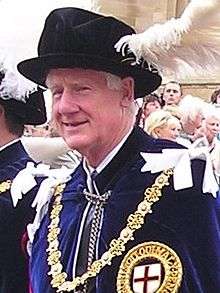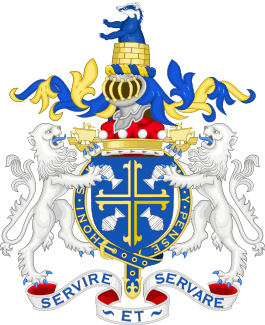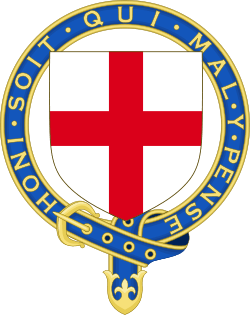Robin Butler, Baron Butler of Brockwell
| The Right Honourable The Lord Butler of Brockwell KG GCB CVO PC | |
|---|---|
 Lord Butler in the robes of a Knight Companion of the Order of the Garter. | |
| Cabinet Secretary Head of the Home Civil Service | |
|
In office 1988–1998 | |
| Prime Minister |
Margaret Thatcher John Major Tony Blair |
| Preceded by | Sir Robert Armstrong |
| Succeeded by | Sir Richard Wilson |
| Principal Private Secretary to the Prime Minister | |
|
In office 1979–1985 | |
| Prime Minister | Margaret Thatcher |
| Preceded by | Clive Whitmore |
| Succeeded by | Nigel Wicks |
| Personal details | |
| Born |
3 January 1938 Lytham St Annes, Lancashire, England, UK |
| Spouse(s) | Gillian Lois Galley (1962-present) |
| Children | 3 |
| Alma mater | University College, Oxford |
Frederick Edward Robin Butler, Baron Butler of Brockwell, KG, GCB, CVO, PC (born 3 January 1938) is a retired British civil servant, now sitting in the House of Lords as a crossbencher.
Early life and family
Butler was born in Lytham St Annes, Lancashire, on 3 January 1938. He went to Orley Farm School & Harrow School (where he was Head Boy), then taught for a year at St Dunstan's School, Burnham-on-Sea, before going up to University College, Oxford, where he took a double first in Mods and Greats and twice gained a Rugby Blue. He married Gillian Lois Galley in 1962. They have a son and two daughters.[1]
Civil service career
Butler had a high-profile career in the civil service from 1961 to 1998, serving as Private Secretary to five Prime Ministers. He was Secretary of the Cabinet and Head of the Home Civil Service from 1988 to 1998.[2]
He joined HM Treasury in 1961, becoming Private Secretary to the Financial Secretary to the Treasury 1964–66 and Secretary to the Budget Committee 1965–69.[2]
Early in his career, he was occasionally confused with his namesake Rab Butler. Memos for Rab Butler, some highly sensitive, ended up on his desk, and some of his ended up on Rab's. It was agreed that all memos ambiguously addressed to "R Butler" should go to Rab's office first, and then Rab's office would send on any intended for the other R Butler. It is said that one day the young Butler, who was still playing first class rugby, received a letter that read: "You have been selected for the Harlequins 1st XV on Saturday. Please be at Twickenham by 2 p.m.". Underneath, in Rab's distinctive handwriting, was the message: "Dear Robin, I am not free on Saturday. Please could you deputise for me? Rab"![3]
In 1969, he was seconded to the Bank of England and several City institutions. Later at HM Treasury as Assistant Secretary, General Expenditure Intelligence Division, he led the team which installed the UK Government's computerised financial information system 1975&–77. He had been a founder member of the Central Policy Review Staff under Lord Rothschild 1971–2. After several senior appointments at the Treasury, he became second Permanent Secretary, Public Expenditure, 1985–87.
He was Private Secretary to Prime Ministers Edward Heath (1972–74) and Harold Wilson (1974–75), and Principal Private Secretary to Margaret Thatcher (1982–85).[1][2] Along with Thatcher, he was almost killed in the 1984 IRA bombing of the Grand Hotel in Brighton.[1] He was also Cabinet Secretary during the premierships of Margaret Thatcher, John Major and Tony Blair.[1][2]
Other activities
After retiring from the Civil Service, he was Master of University College, Oxford, 1998–2008,[2] and was made a Life Peer as Baron Butler of Brockwell, of Herne Hill in the London Borough of Lambeth in the 1998 New Year Honours List.
He became a non-executive Director of HSBC Group from 1998 to 2008. He is also Chairman of the Corporate Sustainability Committee and the HSBC Global Education Trust. In 2011, he was elected Master of the Worshipful Company of Salters.[2]
In 2004, Lord Butler chaired the Review of Intelligence on Weapons of Mass Destruction, widely known as the 'Butler Review', which reviewed the use of intelligence in the lead up to the 2003 Iraq War. The report concluded that some of the intelligence about Iraq's possession of Weapons of Mass Destruction was seriously flawed. The report also concluded, in regards the so-called Niger uranium forgeries, that the report Saddam's government was seeking uranium in Africa appeared "well-founded".[4]
Styles, honours, and arms
Styles
- Mr Robin Butler (1938–1986)
- Mr Robin Butler, CVO (1986–1988)
- Sir Robin Butler, KCB, CVO (1988–1992)
- Sir Robin Butler, GCB, CVO (1992–1998)
- The Rt Hon. The Lord Butler of Brockwell, GCB, CVO (1998–2003)
- The Rt Hon. The Lord Butler of Brockwell, KG, GCB, CVO (2003–2004)
- The Rt Hon. The Lord Butler of Brockwell, KG, GCB, CVO, PC (2004–present)
Honours
- Commander of the Royal Victorian Order (CVO), 1986
- Knight Commander of the Most Honourable Order of the Bath (KCB), 1988
- Knight Grand Cross of the Most Honourable Order of the Bath (GCB), 1992
- Life peerage, 31 December 1997
- Knight of the Garter (KG), 23 April 2003
- Privy Counsellor (PC), 2004
Arms
 |
|
References
- 1 2 3 4 BBC News Profile: Lord Butler of Brockwell
- 1 2 3 4 5 6 Salt Talk issue 9 (2011) p6 "The Master"
- ↑ D. R. Thorpe (2011) "Supermac - the Life of Harold MacMillan" Random House, ISBN 1844135411, page 751
- ↑ Review of Intelligence on Weapons of Mass Destruction, HC 898 (London: The Stationery Office, 14 July 2004) via BBC. Section 499, p. 137 for "well-founded". Retrieved 2011-09-03.
- ↑ The Arms of The Right Honourable Baron Butler of Brockwell, Grants of Arms (December 2003). College of Arms website. Retrieved 19 December 2013.
Offices held
| Government offices | ||
|---|---|---|
| Preceded by Clive Whitmore |
Principal Private Secretary to the Prime Minister 1979–1985 |
Succeeded by Nigel Wicks |
| Preceded by Sir Robert Armstrong |
Cabinet Secretary & Head of the Home Civil Service 1988–1998 |
Succeeded by Sir Richard Wilson |
| Academic offices | ||
| Preceded by John Albery |
Master of University College, Oxford 1998–2008 |
Succeeded by Sir Ivor Crewe |
External links
- Oxford University Gazette announcement of election as Master
- The Arms of Lord Butler of Brockwell
- For the story about Rab Butler's memos
- thePeerage.com, used for Honours
- Debrett's People of Today
.svg.png)
